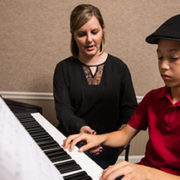April 09, 2015
Top Music Education Benefits for Children and Adults


Music has the power to truly enrich our lives. By learning to play an instrument, students of all ages become more well-rounded. Even adults can experience these music education benefits! The joy of playing music transcends age, race, and culture.
It doesn’t matter whether someone loves classical, jazz, pop, rock, or everything in between. When you learn music, your life changes for the better. There are countless music education benefits.
These benefits include but are not limited to:
- Increase in unrelated, practical skills
- Lower stress levels.
- A better, more positive outlook on life.
- Better test scores
- Improved memory
- Better focus
Here are some of the top music education benefits for kids and adults.
Top Music Education Benefits for Kids
Kids can begin learning music at any age. Many studies show that children who learn music have higher test scores and stronger social skills than their non-musical peers. Music education programs and private lessons are among the best ways to ensure a child’s success in school. Students also experience these benefits of music education:
- Improved math and science skills
- Increased test scores
- Better language skills
- Better focus and self-discipline
- Therapy for special needs students
- Higher graduation rates
Math and Science Skills
Playing a musical instrument improves math skills, even in young children. When students receive music instruction, they learn many concepts that transfer to mathematics.
Music teaches:
- Counting
- Division
- Patterns
- Greater spatial awareness and logic.
As music students get older, they also perform better in the sciences. Many musical concepts overlap with physics. This includes sound waves, frequencies, and concepts such as the Doppler effect. Students are often able to grasp these ideas more easily when they can apply them to music.
If you’re a parent hoping to encourage your child’s success in STEM, musical training with a private instructor can make a huge impact.
Increased Test Scores
Playing music also increases standardized test scores. According to the National Association for Music Education, students who play musical instruments consistently score higher on the SAT:
- In reading, music students scored an average of 31 points higher than their nonmusical peers
- In math, they scored an average of 23 points higher
- In writing, they scored an average of 31 points higher
Playing a musical instrument requires hard work, focus, and practice. These are the same skills that help students prepare for tests. By applying the same dedication to exams, children who study music are more likely to outperform their nonmusical peers.
Language Skills
The benefits of music cross over into language, too. A recent MIT Study found that music education improved the language skills of kindergartners. The young children in the study were given private piano lessons, which increased their ability to distinguish pitch. As a result, they could hear the subtle differences between spoken words better than the control group.
Learning music also develops important listening skills. As students get older and play in bands or orchestras, they must learn to actively listen to other instrument sections. This improves their ability to process auditory information.
Focus and Self-Discipline
Music activities encourage focus and self-discipline. In their music lessons, children are taught valuable skills that will help them in other areas. For example, daily practice for these lessons is very important when learning musical instruments. As students begin a practice routine, they learn how to structure their time. This helps kids and teens prioritize their responsibilities.
In the smartphone era, when attention spans are becoming shorter and shorter, music helps children concentrate. It encourages them to “unplug” and stay focused on a single activity. This valuable skill transfers over to studying as well as other hobbies and sports.
Therapy for Special Needs Students
Special needs students greatly benefit from music education. Many schools incorporate a music program into their special education department. If your school doesn’t offer this, private lessons are a great option. Among the many benefits of music, learning how to play an instrument can make a big impact on students with special needs. Music therapy can help these students open up and communicate.
For some special needs students, playing music also:
- Helps develop motor skills.
- Teaches them to solve problems
- Improves their confidence
- Increases their social skills.
Higher Graduation Rates
Finally, the benefits of music education for kids includes higher graduation rates. According to the Children’s Music Workshop, schools with a music program have an estimated 90.2% average graduation rate. Schools that don’t teach music have an average 72.9% rate.
Studies show that music arts education also increases attendance rates. Other benefits of music lessons include higher admittance to college and greater career success.
Top Music Education Benefits for Adults
Of course, kids aren’t the only ones who can experience music education benefits. Adults can also improve their lives when they study music.
Music can:
- Reduces stress
- Improves health
- Increase memory function
- Keep your brain young.
It’s never too late to learn to play a musical instrument! In fact, taking music lessons as you get older can open up a world of new possibilities.
Stress Relief
Music does wonders for stress. For adults who have high-pressure jobs and busy family lives, playing music is a great way to relax. Many musicians compare it to meditation. It can be a powerful tool for self-care. Try taking a few minutes each day to shut out all distractions and play an instrument.
Similarly, taking music lessons gives adults a new hobby to focus on. This relieves stress and creates more joy in life.
Better Health
Music education benefits include better health. Whether taking music lessons or simply listening to their favorite songs, adults who fill their time with music tend to live longer, healthier lives.
Studies show that music can:
- Improve the body’s immune system
- Reduce anxiety
- Encourage better sleep.
A study of cataract patients found that music lowered blood pressure before, during, and after surgery. There is also evidence to suggest that music can be an effective antidepressant. As experts continue to study music and health, new benefits are being discovered all the time.
Improved Memory
One of the many music education benefits is improved memory. Numerous studies show that music encourages neurological activity. In other words, music keeps your brain young. Taking music lessons includes learning new skills, like reading sheet music. This trains your mind to process new information faster.
Among older adults with memory problems, such as Alzheimers, music has been shown to have tremendous benefits. Playing music or learning a new instrument improves brain function and memory recall.
Social Engagement
As adults, it’s often hard to have an active social life and make new friends. Between work and family life, many adults find it difficult to engage with an outside community. One of the music education benefits is meeting new people.
Playing in a band or orchestra gives you the opportunity to make new friends and become more socially engaged. Learning music is fun, exciting, and social.
Music Lessons with Music & Arts
With all these music education benefits, why not get started today? Sign up for music lessons for yourself or your child at Music and Arts. Working one-on-one with you trained music educator gives students of every age and musical interest the tools they need to thrive any time of the year. So whether you want to learn an instrument for the first time or develop the musical skills you already have, lessons with Music & Arts will help.







